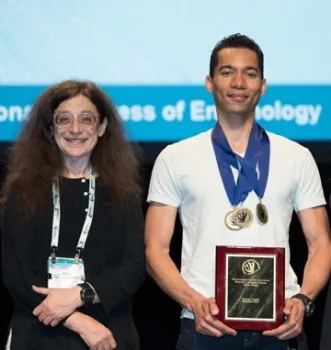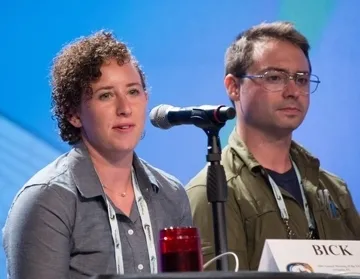
The UC Berkeley-UC Davis Linnaean Games Team, comprised of graduate students from UC Berkeley and UC Davis, won the championship at the regional Linnaean Games hosted by the Pacific Branch, Entomological Society of America (PBESA) at its meeting June 10-13 in Reno.
The Linnaean Games are a lively question-and-answer, college bowl-style competition on entomological facts played between university-sponsored student teams. The teams score points by correctly answering random questions.
The team, captained by Ralph Washington Jr., a graduate student in public policy at UC Berkeley, (formerly a graduate student at UC Davis), included UC Davis doctoral students Brendon Boudinot, Zachary Griebenow and Jill Oberski, all of the Phil Ward lab, and Emily Bick of the Christian Nansen lab.
The UC Berkeley-UC Davis team defeated Washington State University (WSU) in a sudden death overtime to win the title.
“Davis vs WSU was the final game of the night,” related Boudinot. “This went into Sudden Death as the teams were tied 90-90 after several UC Davis interrupts reduced their point total. We came back from DOWN to tie at about 15th question, and the sudden death question was specifically selected to be challenging. The key details were ‘Dutch ... microscopist from the 17th century.' WSU buzzed in on the interrupt and stated "Leeuwenhoek," which was incorrect, leading to their elimination. The correct answer was Swammerdam."

Some of the questions asked at this year's PBESA Linnaean Games, as related by Ralph Washington Jr.:
Question: Name the fungal agent that grows naturally in soils throughout the world and causes white muscardine disease and is commercially packaged as a biological insecticide for the control of termites, whiteflies, and other insect pests?
Answer: Beauveria bassiana
Question: Name the process through which spiders use silk to fly and disperse.
Answer: Ballooning.
Question: Where are you most likely to encounter a rheophilic insect?
Answer: In moving streams.
The UC Davis Linnaean team, captained by Washington, won the national championship in both 2015 and 2016. Boudinot served as a member of both championship teams. Bick was a member of the 2016 team, which also was comprised of graduate students Jéssica Gillung and Ziad Khouri, who study with Lynn Kimsey, director the Bohart Museum of Entomology.
The list of national champions over the last five years:
2017
1st Place: Texas A&M
2nd Place: The Ohio State
2016
1st Place: University of California, Davis
2nd Place: University of Georgia
2015
1st Place: University of California, Davis
2nd Place: University of Florida
2014
1st Place: North Carolina State University
2nd Place: University of Florida
2013
1st Place: University of California- Riverside
2nd Place: Mississippi State University
The Pacific Branch of ESA is comprised of 11 states (Alaska, Arizona, California, Hawai'i, Idaho, Montana, Nevada, Oregon, Utah, Washington, and Wyoming), plus U.S. territories (American Samoa, the Federated States of Micronesia, Guam, Johnston Atoll, Commonwealth of the Northern Mariana Islands, Midway Islands and Wake Island) and parts of Canada (Alberta, British Columbia, Northwest Territories, Saskatchewan and Yukon) and parts of Mexico (Baja California, Baja California Sur, Sinaloa and Sonora).
Founded in 1889, the 7000-member ESA is the largest organization in the world serving the professional and scientific needs of entomologists and individuals in related disciplines. Its members are affiliated with educational institutions, health agencies, private industry, and government. Members are researchers, teachers, extension service personnel, administrators, marketing representatives, research technicians, consultants, students, pest management professionals, and hobbyists.
Resources:
- Watch the 2016 National Linnaean Games Championship Round (won by UC Davis), posted on YouTube
- Watch the 2015 National Linnaean Games Championship Round (won by UC Davis), posted on YouTube

